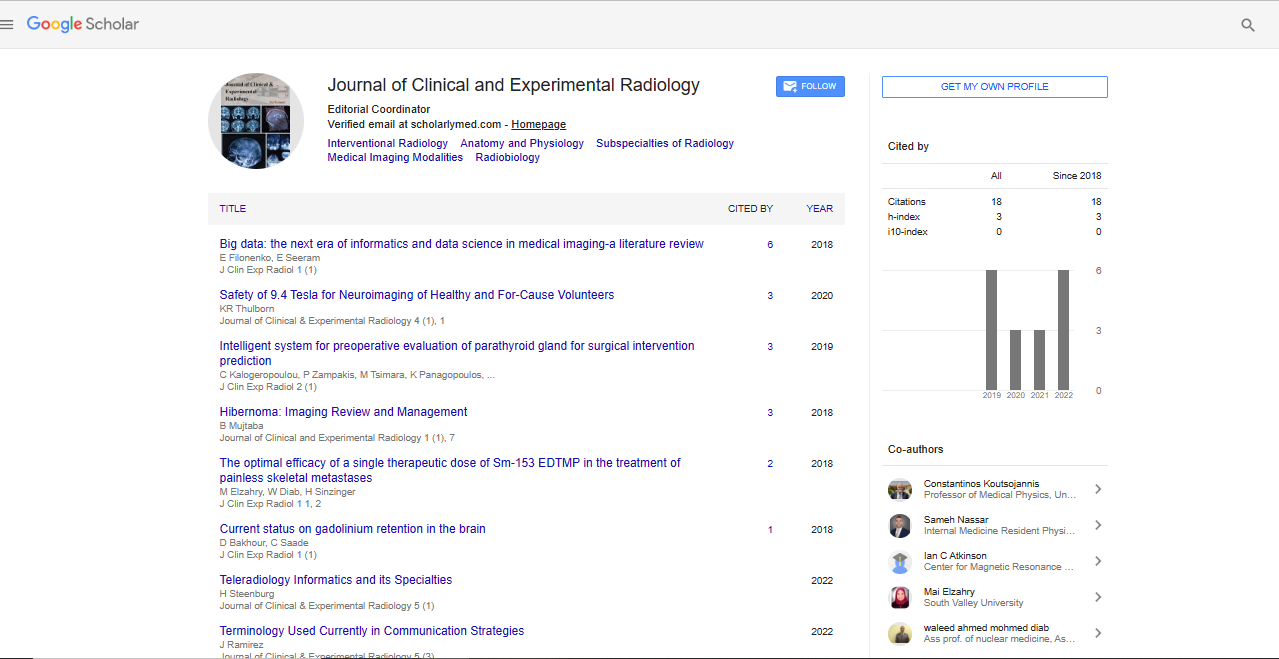Commentary, J Clin Exp Radiol Vol: 6 Issue: 4
Radiation Oncology: Principles, Techniques, Advancements
Klein Timoathy*
1Department of Radiation Oncology, University of Pennsylvania, Philadelphia, USA
*Corresponding Author: Klein Timoathy,
Department of Radiation Oncology,
University of Pennsylvania, Philadelphia, USA
E-mail: kltimoathy@gmail.com
Received Date: 24 November, 2023, Manuscript No. JCER-24-124145;
Editor assigned Date: 27 November, 2023, PreQC No. JCER-24-124145 (PQ);
Reviewed Date: 13 December, 2023, QC No. JCER-24-124145;
Revised Date: 20 December, 2023, Manuscript No. JCER-24-124145 (R);
Published Date: 27 December, 2023, DOI: 10.4172/jcer.1000153
Citation:Timoathy k (2023) Radiation Oncology: Principles, Techniques, Advancements. J Clin Exp Radiol 6:4.
Description
In the relentless pursuit of advancing cancer care, radiation oncology emerges as a foundation field where precision meets compassion to combat one of humanity's most formidable foes. This manuscript delves into the intricate world of radiation oncology, resolving its principles, techniques, advancements, and the extreme impact it has on the lives of those facing the challenges of cancer.
Foundations of Radiation Oncology
Understanding radiation therapy: Radiation oncology employs high-energy radiation to target and eradicate cancer cells. This therapeutic uses the ability of ionizing radiation to damage the Deoxyribonucleic Acid (DNA) of rapidly dividing cancer cells, halting their growth or causing cell death. It is a crucial component of multimodal cancer treatment, often used in conjunction with surgery and chemotherapy.
Radiation modalities: Various modalities are employed in radiation oncology, each tailored to specific clinical scenarios. External beam radiation delivers radiation from outside the body using machines like linear accelerators, while brachytherapy involves placing radioactive sources directly into or near the tumor. These modalities allow for precise targeting while minimizing exposure to surrounding healthy tissues.
Techniques and technologies
Intensity-Modulated Radiation Therapy (IMRT): IMRT is an advanced technique that adjusts the intensity of the radiation beams in different parts of the treatment area. This precision allows for the delivery of higher doses to the tumor while sparing adjacent normal tissues. IMRT is particularly valuable in treating tumors in complex anatomical locations.
Stereotactic Body Radiation Therapy (SBRT): SBRT delivers highly focused radiation to small, well-defined tumors in the body. This technique is also known as Stereotactic Ablative Radiotherapy (SABR), enables precise targeting of tumors in a limited number of treatment sessions, offering an effective option for certain localized cancers.
Personalized radiation oncology
Image-Guided Radiation Therapy (IGRT): IGRT incorporates imaging techniques to verify and adjust the position of the patient and the tumor before and during treatment. This ensures accurate targeting and enhances the precision of radiation delivery, particularly important for tumors affected by motion, such as those in the lungs or abdomen.
Adaptive Radiation Therapy (ART): ART involves modifying the treatment plan based on changes observed in the tumor or surrounding tissues during the course of treatment. By adapting to the dynamic nature of cancer, ART optimizes the therapeutic impact while minimizing the risk of side effects.
Combating cancer with proton therapy
Principles of proton therapy: Proton therapy is an advanced form of radiation therapy that uses protons, which deposit their energy precisely at the tumor site. This characteristic minimizes radiation exposure to surrounding healthy tissues, making proton therapy particularly advantageous for certain pediatric cancers and tumors near critical structures.
Clinical applications and considerations: Proton therapy is increasingly utilized for various cancers, including brain tumors, prostate cancer, and pediatric malignancies. However, its widespread adoption is influenced by factors such as treatment cost, accessibility, and ongoing research to delineate its comparative effectiveness in different clinical scenarios.
Advancements in radiobiology and immunotherapy
Radiobiological insights: Radiobiology explores the biological effects of radiation on living tissues. Advances in radiobiology contribute to a deeper understanding of how radiation interacts with cancer cells and normal tissues. This knowledge informs the development of novel treatment strategies and personalized approaches in radiation oncology.
Immunotherapy synergy: The intersection of radiation oncology and immunotherapy is a frontier of exploration. Radiation's ability to induce immunogenic cell death and enhance immune responses is harnessed synergistically with immunotherapeutic agents. This combination holds promise for unleashing the immune system to target and eradicate cancer cells.
Survivorship and quality of life
Long-term effects and survivorship: Survivorship in radiation oncology extends beyond the completion of treatment. Understanding and managing potential long-term effects, such as radiation-induced late toxicity, is essential for ensuring the well-being of cancer survivors. Long-term follow-up and survivorship care plans contribute to a holistic approach to cancer care.
Quality of life considerations: Radiation oncologists prioritize maintaining or improving the quality of life for patients undergoing treatment. This involves a delicate balance between eradicating cancer cells and minimizing the impact on normal tissues. Supportive care measures, including symptom management and psychological support, are integral components of comprehensive cancer care.
 Spanish
Spanish  Chinese
Chinese  Russian
Russian  German
German  French
French  Japanese
Japanese  Portuguese
Portuguese  Hindi
Hindi 